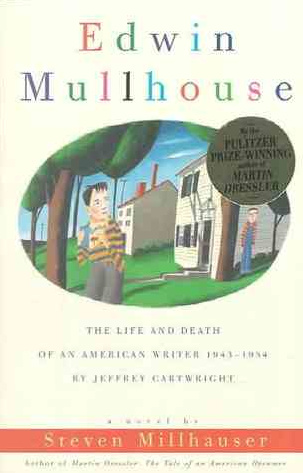

Steven Millhauser · 305 pages
Rating: (784 votes)
“For what is genius, I ask you, but the capacity to be obsessed? ...We have all been geniuses, you and I; but sooner or later it is beaten out of us, the glory faded, and by the age of seven most of us are nothing but wretched little adults.”
― Steven Millhauser, quote from Edwin Mullhouse: The Life and Death of an American Writer 1943-1954 by Jeffrey Cartwright
“Perhaps sound is only an insanity of silence, a mad gibber of empty space grown fearful of listening to itself and hearing nothing.”
― Steven Millhauser, quote from Edwin Mullhouse: The Life and Death of an American Writer 1943-1954 by Jeffrey Cartwright
“... now and again we would happen to step out of the familiar universe into a sudden sharp shock of sweetly scented air, sudden as spilled perfume, piercing as crystal, dark and sweet as the sound of oboes.”
― Steven Millhauser, quote from Edwin Mullhouse: The Life and Death of an American Writer 1943-1954 by Jeffrey Cartwright
“... it is the purpose of this history to trace not the mere outlines of a life but the inner plan, not the external markings but the secret soul.”
― Steven Millhauser, quote from Edwin Mullhouse: The Life and Death of an American Writer 1943-1954 by Jeffrey Cartwright
“Kitten, I’d break my fucking pitching arm if it meant keeping you safe.”
― J. Sterling, quote from The Perfect Game
“Keşke hiç olmasaydın şu dünyada, keşke sana hiç rastlamasaydım, keşke canlı bir varlık olacak yerde esinli bir ressamın yarattığı bir tablo olsaydın. O zaman resminin önünden hiç ayrılmaz, sonsuzcasına sana bakardım... öper, öperdim seni. Sonsuz güzel bir düş gibi seni yaşar, seni solur ve... mutlu olurdum.”
― Nikolai Gogol, quote from Diary of a Madman and Other Stories
“But I guess you would look beatific, too, if the man you had been in love with since the fifth grade had told you that he was in love with you, too.”
― Meg Cabot, quote from Teen Idol
“I kept quiet, but the knowledge gathered like a storm. I could see the future: My father wasn't coming back. And this one fact seemed to point to other facts and others still: Love frays and humans fail, time passes, eras end.”
― Karen Thompson Walker, quote from The Age of Miracles
“My dad had once told me, crimson-red deep in “the talk,” that with sons, all he had to worry about was one penis, but with a daughter, he had to worry about everyone else’s.”
― Nicole Williams, quote from Crash
BookQuoters is a community of passionate readers who enjoy sharing the most meaningful, memorable and interesting quotes from great books. As the world communicates more and more via texts, memes and sound bytes, short but profound quotes from books have become more relevant and important. For some of us a quote becomes a mantra, a goal or a philosophy by which we live. For all of us, quotes are a great way to remember a book and to carry with us the author’s best ideas.
We thoughtfully gather quotes from our favorite books, both classic and current, and choose the ones that are most thought-provoking. Each quote represents a book that is interesting, well written and has potential to enhance the reader’s life. We also accept submissions from our visitors and will select the quotes we feel are most appealing to the BookQuoters community.
Founded in 2023, BookQuoters has quickly become a large and vibrant community of people who share an affinity for books. Books are seen by some as a throwback to a previous world; conversely, gleaning the main ideas of a book via a quote or a quick summary is typical of the Information Age but is a habit disdained by some diehard readers. We feel that we have the best of both worlds at BookQuoters; we read books cover-to-cover but offer you some of the highlights. We hope you’ll join us.